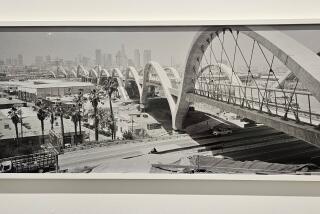Sophie Calle investigates the distance between us in ‘Suite Vénitienne’
For more than 30 years now, Sophie Calle has engaged in art as provocation; her 1983 project “The Address Book” begins with the discovery, on a street in Paris, of an address book, which she then uses to excavate the life of its owner, contacting everyone within.
The point is voyeurism, yes — or more accurately, a kind of intentional intrusion — but it is also, and most essentially, an inquiry into the unbridgeable distances between us, the layers, the nuances, everything we cannot know.
Calle developed this sort of investigatory aesthetic with her first book “Suite Vénitienne” (Siglio: 96 pp., $34.95), which operates (on the surface, anyway) as something of a simple diary: The artist follows a man, known here as only Henri B., from Paris to Venice, where she spends 12 days trailing him.
The two don’t know each other, or only slightly; as she explains, “At the end of January 1980, on the streets of Paris, I followed a man whom I lost sight of a few minutes later in the crowd. That very evening, quite by chance, he was introduced to me at an opening. During the course of our conversation, he told me he was planning an imminent trip to Venice. I decided to follow him.”
The result is this thrilling book, first published in 1983 and long out of print, now newly reissued in an understated English edition, blending matter-of-fact daily text entries with Calle’s elusive black and white photography.
For Calle, the idea is to push the bounds of propriety, to go where one wouldn’t ordinarily go. This is — have no doubt — an assault on privacy, autonomy, undertaken without permission and enacted for the public, a public with which the subject may or may not wish to engage.
That’s one of the challenges of her work, the discomfort we feel as she crosses the line. How would it be if we were Henri B., exposed without permission, written about, photographed?
In Venice, it takes Calle five days to find him, a process she records methodically. After that, she stalks him, taking pictures of him with an unnamed woman, re-creating with her own camera some of the photographs he takes.
Henri B. is both the center of the work and an enigma, always at a distance. This doesn’t change, not really, even after Calle blows her cover; “Your eyes, I recognize your eyes,” he tells her; “that’s what you should have hidden.”
As to why this moves me so much, it is, I think, a matter of construction, the parallel development of two selves.
First, there’s Henri, seen but not seen, a man we know through only his movements, which are both inexplicable and mundane, a loose accumulation of random interactions that add up to a life. Then, there is Calle, the watcher, not quite telling us what it is she’s doing, tracking him for reasons of her own.
“What did I imagine?” she wonders. “That he was going to take me with him, to challenge me, to use me? Henri B. did nothing. I discovered nothing. A banal ending to this banal story.”
And yet, that banality, that nothing, is precisely the point, for this is what we have. We move through the days on our own internal missions, mysterious and unknowable to anyone outside. This is the conundrum at the heart of Calle’s work, from “Suite Vénitienne” to “The Address Book” to more recent projects such as “Take Care of Yourself,” in which she distributed a break-up email, sent to her by an ex-lover, to 107 women and presented their responses.
The idea, of course, is that Calle is complicit in her own exposure, that she is the subject as much as those she records. It’s what makes her investigations so provocative, this sense of implication, that in exposing the lives of others, she is actually exposing herself.
Still, what is she exposing, really? Nothing that isn’t already known. Henri B., for instance — what do we know about him? Not even his full name; the whole idea, indeed, is that as much as Calle might want to learn about him, she can only get so close.
In that sense, “Suite Vénitienne” is less a work of appropriation than of the imagination, an expression of what we all do all the time. I am reminded of David Foster Wallace, who in “This Is Water” urges us to imagine with generosity the lives we encounter: “I can choose,” he tells us, “to force myself to consider the likelihood that everyone else in the supermarket’s checkout line is just as bored and frustrated as I am, and that some of these people probably have harder, more tedious and painful lives than I do.”
This may seem a stretch, to frame Calle’s art as gift more than surveillance, but that is the miracle of this edgy and disturbing book. We can never truly know each other, Calle is saying, or for that matter ourselves, which means that we are always watching, always investigating, always looking for clues that are themselves less revealing than emblematic of how little there is to reveal.
Twitter: @davidulin
More to Read
Sign up for our Book Club newsletter
Get the latest news, events and more from the Los Angeles Times Book Club, and help us get L.A. reading and talking.
You may occasionally receive promotional content from the Los Angeles Times.







